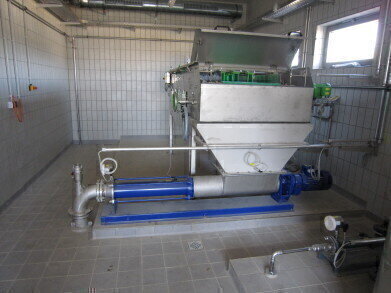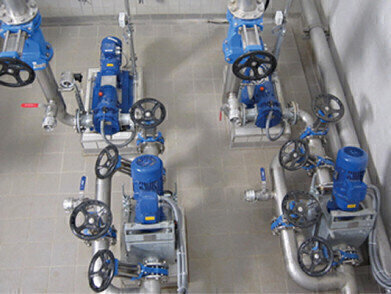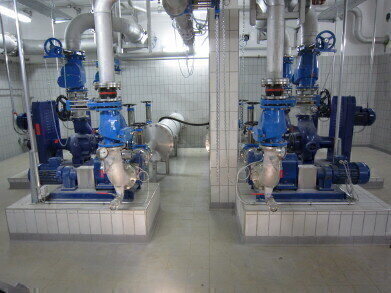-
 For transportation of thickened sludge with eight to eleven percent dry content matter, NEMO® BF hoppers are used. Their rotor-stator principle ensures conveying at a stable pressure, independent of the consistency or viscosity of the medium.
For transportation of thickened sludge with eight to eleven percent dry content matter, NEMO® BF hoppers are used. Their rotor-stator principle ensures conveying at a stable pressure, independent of the consistency or viscosity of the medium. -

Water/Wastewater
From inflow to sludge treatment: Different types of pumps and grinders ensure reliability of the process in sewage plants
May 24 2017
Water and environmental protection specifications, efficiency and economic questions have resulted in sewage plant processes becoming very complex. Media of different viscosities from untreated waste water up to thickened sludge must be handled. In order to ensure smooth conveyance at all stages, NETZSCH Pumpen & Systeme GmbH combined different types of pumps in a Swabian sewage plant. The pumps were especially adapted to the demanding operating conditions. The specific design was selected for the corresponding medium and pressure required. Thus, in conjunction with the coarse material macerators of the company, high operating safety and reliability from one source was attained.
Waste water presents a particular challenge to the conveying systems: The composition changes and, in particular, the ratio of coarse materials, whereby, congestion of the material and increased wear can occur. Due to the risk of blockage at different locations – for example, at the infeed or at the sludge presses – the community had M-Ovas® cutting plate grinders installed upstream of the NETZSCH pumps, that finely cut up any coarse material so that the conveying sequence is no longer impaired. The macerators are designed so that they can be installed directly in the pipe line. An integrated separator collects foreign matter, such as stones, that can then be removed through a separate cleaning aperture. The actual medium is ground in a cutting unit using hard metal blades. A flywheel assists the drive, thus reducing the energy required. The complete system, including the drive inclined upwards is of a very compact design, so that it only requires a little space. This was all the more important because the space for installation available in the machine rooms was very limited.
For this reason, the rotary lobe pumps type TORNADO® were also selected for the transportation of waste water from the infeed and between the different clarification and cleaning stages. It features a high power density and depending on the design, up to 1000 m³/h at up to 8 bar can be conveyed. The pumps are very robustly designed and, due to their large free ball passage and correspondingly large foreign matters or content material can be conveyed with no problem.
Pressure-stable conveyance of thick sludge using progressing cavity pumps
In contrast, handling the thickened sludge resulting from the clarification process presents a problem. This sludge contains approximately eight to eleven percent of dry matter content and, due to its composition, no longer features linear flow characteristics similar to water. However, in order to ensure consistent conveying at 4 bar, NEMO® progressing cavity pumps have been installed at the appropriate locations in the process, for example, for transporting to and from the digestion tank.
The conveyance principle is based on a rotor which turns in an oscillating motion within a fixed stator. The result is – dependent on the geometry pairing between rotor and stator – conveying chambers in which the medium is uniformly moved from the suction to the discharge side by the rotary motion. Thereby, pressure and conveying volume remain stable, independent of the consistency or viscosity of the medium.
Events
Jul 23 2025 Sydney, Australia
Aug 24 2025 Stockholm, Sweden and online
Aug 27 2025 Busan, South Korea
Sep 02 2025 Mexico City, Mexico
Sep 02 2025 Mexico City, Mexico

















